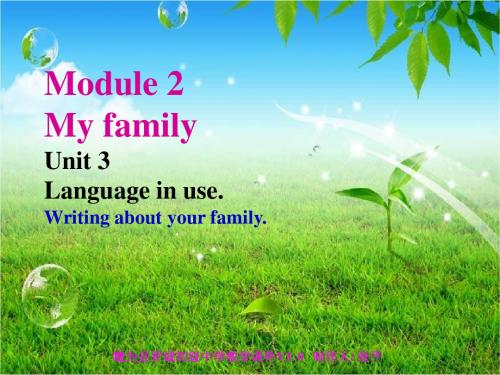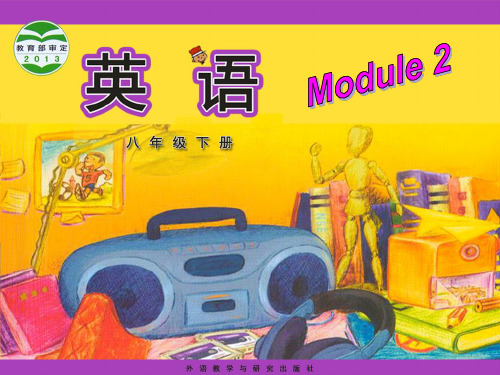Module 2 Unit 3
外研七年级上册Module 2Unit3 教学课件(50张)

e.g.: There is a shop near here.
Ext.: e.g.: (1) They often shop for meat.
shop vt 购物; 逛商店
(2) They often go shopping on Sunday.
(3) Mrs Smith is doing some shopping at the
事物.
6.1. e.g.: (1) This is my mother.
Hale Waihona Puke (2) These are my parents.
this 和that 为单数指示代词
these和 those为复数指示代词.
This is …
这(位)是…
用于介绍
6.2. e.g.: (1) This girl is Betty.
Module 2 Unit 3
Module task: Write about your family. Draw your family tree. Work in pairs. Talk about each other's family. A: What's your father's name?... B: My father's name's… A: Is he…? …
6.5. e.g.: — Who's that speaking? — This is Tom speaking.
this/that 用于电话日常用语中. 打电话时, 用“This is …”句型介绍自己. 问对方是谁可用“Who's that (speaking)?”
Module 2 Unit 3
外研版八年级英语下册课件:Module 2 Unit 3 (共48张PPT)

to your family or friend. c) A tree is also something special for a
festival or a new baby. d) Have you ever been to a forest? e) Grow a tree near you!
3. 一般疑问句式: Have / Has+主语+动词过去分词+其他? 肯定答语为Yes, 主语 + have / has.; 否定 答语为No, 主语 + haven’t / hasn’t. e.g. —Have you ever visited that museum? —Yes, I have. / No, I haven’t. —Has she made some chocolate cookies? —Yes, she has. / No, she hasn’t.
7) cook dinner for your parents
Have you ever cooked dinner for your parents?
2. Work in pairs. Ask and answer the questions in the questionnaire in Activity 1. Then complete the Your partner column.
4. How did Diana travel there? She travelled there by train.
5. Has Bob ever visited Germany? Yes, he has. He’s been all over Europe.
外研版九年级英语上册课件 Module2 Unit3

作简短的演讲 为……感恩 乘船抵达美洲 种玉米 第二年; 翌年 摆放餐具 一年一次 也
make short speeches give thanks for … arrive in America by ship grow corn the following year lay the table once a year as well
Last night I waited until eleven o’clock, but
he didn’t return. 昨天晚上我一直等到11点,但他还没回来。
My son won’t come home until it is dark. 我儿子不到天黑不回家。
◆ since可引导时间状语从句, 意为“自从 ……的时候起;从此;从 ……以来; …… 以后”等。
1. We went skating in the afternoon before / when the party started. 2. As soon as /After dinner, we joined a group of friends and we all went to the square. 3. While / When they were watching TV, we listened to music and sang traditional songs. 4. As soon as / After it was 12 o’clock, we all shouted “Happy New Year” very loudly.
I haven’t seen him since I was a student at school.
外研版英语八年级上册Module3 Unit2 基础知识归纳

Unit2 基础知识归纳1.......we are going to play against another school next week.……我们下周将和另一个学校比赛。
句中against为介词,表示反对,对......对抗。
against常见用法如下:表示反对,其反义词为for。
若表示强烈反对,一般用副词strongly;经常同那些与之含义相关的动词连用。
如:fight, struggle, protest, argue, guard等。
Are you for or against the plan? 你对这个建议是赞成还是反对呢?The soldiers fought against the enemies bravely.士兵们勇敢地反抗敌人。
2. The practice starts at 10 am. We all arrive as early as we can so that we have time to warm up.训练上午10:00开始,我们尽可能早到,以便于有时间热身。
(1)as early as we can尽早;as...as sb. can=as...as possible.We should speak English as much as we can.=We should speak English as much as possible.(2)so that可引导目的状语从句,意为“以便,目的是”,此时so that后面从句中的谓语动词常和may, can, should等情态动词连用。
也可引导结果状语从句。
He got up very early so that he could catch the train.他起得很早以便能赶上火车。
(目的状语从句)He raised his voice, so that everyone heard him.他提高了声音,结果大家都听见了。
Module 3 Unit 2 Are you doing your homework (说课稿)-

Module 3 Unit 2 Are you doing your homework - 说课稿一、教材分析本单元主要介绍了现在进行时的用法,学生将学会运用现在进行时描述正在进行的事情。
本单元的教学内容属于二年级英语下册的第三个模块。
二、教学目标1.熟练掌握现在进行时的用法;2.能描述自己正在做的事情;3.能够运用现在进行时进行简单的交流。
三、教学重难点1.现在进行时的构成和用法;2.现在进行时和一般现在时的区别。
四、教学内容及方法A. 教学内容本单元的主要教学内容如下:1.学习现在进行时的构成和用法;2.学习用现在进行时描述正在进行的事情;3.学习现在进行时和一般现在时的区别。
B. 教学方法本单元的教学方法主要采用交互式教学和情境教学相结合的方式,以学生为主体,老师为引导者。
在教学过程中,采用教师示范、学生模仿、小组合作等方式进行教学。
五、教学过程设计A. 导入新知识(5分钟)1.引入“Are you doing your homework?”主题;2.通过图片、视频等多媒体方式展示学习“现在进行时”。
B. 提供输入和语言模仿(25分钟)1.输入阶段:教师通过多种教学方式对现在进行时进行详细讲解,如构成和用法等;2.语言模仿:教师在引导学生的同时,让他们尝试模仿运用现在进行时。
C. 实践运用(20分钟)1.学生通过小组合作的方式使用所学的现在进行时进行简单的交流;2.学生通过听、说、读、写等方式巩固所学内容。
D. 小结(10分钟)1.教师对本节课所学内容进行总结;2.学生讲述自己本节课所学内容。
六、教学评价通过学生课堂表现、小组合作、与教师沟通等方式,对学生的学习情况进行评价。
七、教学后记本单元的教学内容主要侧重于现在进行时的运用,鼓励学生通过交互式教学的方式主动学习英语,积极参与到教学过程中来,提高英语语言交际能力。
外研英语九年级上册Module 2 Unit 3 宾语从句课件

<注意>注意下列句子中since从句的翻译
It is five years since he lived there. 他不在这里住已经有五年了。
It is a week since he was in the hospital. 他出院已经有一个星期了。
1.I was watching TV _____ my brother was writing an e-mail at home at this
-When will you return the book to me? -I’ll give it to you _____ I finish it. A.when B.while C.as D.as soon as
2.before和after引导的时间状语从句
You’d better make a good plan b__e_fo_r_e_ you take a holiday.
4. -Will you please give the Readers Times to Jane? -Sure, I’ll give it to her _____ she comes back. A.before B.until C.because D.as soon as
5. I’ll go to visit my aunt in England _____ the summer holidays start. A.while B.since C.until D.as soon as
3.修饰副词,副词常用在动词之后。
She jumped happily after she won the gold medal.
4.修饰整个句子。
It’s the last day before the new school year begins.
牛津英语六年级下册Module2 unit3教案 后附练习答案

教案答案::根据所给形容词,填写对应的比较级和最高级二、翻译:1. We have to do it ourselves.2. Does Mary have to study hard at English?3. He had to get up early last Sunday.4. You don’t have to worry about your lessons.5.Peter was very tired and he had to sit down and have a rest.6. He had to stay at home yesterday.7.Hehad to run back to school to get his exercise-books.8. Did you have to leave early?9. I don’t have to stay in bed.10.We have to listen to the teachers carefully.三:选择题BADBC CDBBC BCADB BACCD DCAB、五:完型:答案与提示:Passage 11. C 表示在某月用介词in.2. D Everyone作主语时,当单数看待谓语动词要用动词的第三人称单数形式。
3. B 本句意思是当春节到来时。
4. A help his parents clean their house意为“帮助他的父母亲打扫房子”。
5. B and连接的两个并列谓语动词时态要一致。
6. C on that day.表示在那一天。
7. A 过年吃饺子,蛋糕和其它的食物。
8. B 黄海说饺子比新年的蛋糕更好,而不是A项(更小),C项(更大)D项(更甜)9. C 本句意思是:中国人们在家吃新年的蛋糕和饺子。
10.A 这里的they指代The Chinese people,那么本句意思是他们多么快乐啊!答案与提示:Passage 21. A 此处为泛指,且后无元音音素开头的单词,故应用a,即A选项。
外研版英语七年级上册 Starter Module 2 Unit 3课件

多大,几岁
讲解:
how old用来询问年龄。其句型结构为 “How old+be+主语?”,意为“…… 多大/几岁了?”,相当于“What’s one’s age?”。答语的常用句型为“主 语+be+基数词+year(s)/month(s) old.”, 也可以直接回答年龄。
例句: —How old is Jack?
n. 男孩
例句: The boy sometimes plays table tennis in the afternoon.
n. 女孩
例句: She is a nice girl.
n. 桌子
例句: How many desks are there in the classroom?
n. 椅子
例句: The bag is on the chair.
n. 包;书包
例句:
There are two bags here.
拓展:
Schoolbag 书包
num. 十四
例句:
He used to work fourteen hours a day.
num. 十五
例句: Tom is about fifteen years teen boys are playing ball games.
num. 十七
例句:
There are seventeen items on my shopping list.
Starter Module 2 My English lesson
Unit 3 I’m twelve.
adj. ……年龄 的,……岁的
例句: Lingling is 12 years old.
- 1、下载文档前请自行甄别文档内容的完整性,平台不提供额外的编辑、内容补充、找答案等附加服务。
- 2、"仅部分预览"的文档,不可在线预览部分如存在完整性等问题,可反馈申请退款(可完整预览的文档不适用该条件!)。
- 3、如文档侵犯您的权益,请联系客服反馈,我们会尽快为您处理(人工客服工作时间:9:00-18:30)。
Module 2 Unit 3短语句型背诵
短语和句型:
1. change sth for the better改善某事物,使某事物更好
2. open up sth / sth up打开某(建筑物)的门;开创/开办/开拓/开启某事物open up the class-room building 打开教学楼的大门open up relations between China and the outside world 开启了中国和外部世界的联系open up a business开办一个企业
3. learn sth from sb, learn to do sth from sb跟某人学某物,跟某人学做某事learn to drive from his brother跟他哥哥学开车
4. (be) curious about sth / wh-词引导的宾语从句对某事物感到好奇
5. (be) be curious to know / find out / learn sth很好奇而想了解/知道某事物I’m curious to find out how he is going on with his business. 我很好奇想知道他的事情办得如何。
6. set sail for a place起航去某地leave for a place动身去某地
7. presereved body保存完好的尸身preserved food通过腌制保藏的食品
8. come across sth / sb 偶遇/发现某人/某物(run into sth / sb遇上某人某物;撞到某人某物)
9. a great fortune一大笔财10. as well as sb / sth以及/还有某人某物= along with sb / sth
11. fall / become ill with sth由于…而病倒fall ill with a common cold得了普通感冒fall ill with a high fever 发高烧病倒了
12. on / upon (doing) sth一…(就…)upon their entering the tomb他们一进墓室(某人就…) upon my arrival 我一到(某人就…)
13. hear of sth/ sb听说某事物/某人I’ve never heard of him before.我从没听说过他。
14. only to do sth想不到…(表示一个出人意料的结果) He came to visit his uncle, only to know that they had already moved. 他当时来拜访他的叔叔,却获悉他们一家人已经搬走了。
15. die of / from sth死于…die of an uncommon disease死于一种不常见的疾病
16. have something (much / little / nothing) to do with sth / sb和某人某物有牵扯/有关联(…很有关联/几乎无关联/毫无关联) I don’t know how it happened exactly, but it has something to do with the earthquake. 确切说我不知道这是怎么发生的,不过它和地震有关系。
17. be in connection with sth=have something to do with sth和…有关联
18. result in sth以…为结果,引起/导致…= cause sth Continuous rain will result in a flood.连续下雨会导致洪灾。
Too much sugar can result in a weight problem.吃太多糖会导致体重问题。
19. to this day = until today直到今天20. sth pay off 产生回报(不及物动词),结出硕果All my years of training have finally paid off. 这么多年的训练终于产生回报了!Hard work will pay off. 勤奋总会有回报。
21. the first / second…to do sth第一个/第二个…做某事的人the first woman to fly across the Atlantic第一个驾飞机飞越大西洋的女人
22. get in touch with sb和某人联系上23. set foot on sth踏上某地set foot on the moon踏上月球set foot in sth踏入某地set foot in the room踏入这个房间
24. sb’s love for sth / sb 某人对某人某物的爱(好) her love for animals = her interest in animals她对动物的爱/兴趣
25. sb’s devotion to sb / sth某人对某人某物的热爱/ 热忱付出/ 忠心耿耿(名词短语) (联想:be devoted to sb / sth对某人某物鞠躬尽瘁/忠心耿耿/尽职尽责)Her years of devotion to her work finally paid off. 她对工作的多年付出终于结出硕果。
We are all moved by her devotion to her husband’s parents. 我们都被她对她公婆的付出感动了。
25. inspire sb to do sth激励/启迪某人做某事26. thanks to sth / sb 幸亏某人/某物,多亏某人/某物Thanks to your kindness, these children are living in great comfort. 多亏了你的好心,这些孩子现在生活得很舒坦。
26. Thanks for sth. 因为…而谢谢。
Thanks for your kindness. 谢谢您的好意。
27. live one’s dream=make one’s dream a reality = make one’s dream come true = realize one’s dream实现某人的梦想
28. in orbit沿着轨道29. a desire to do sth做某事的强烈愿望/欲望
30. apply to do sth申请做某事apply for sth申请某物apply for membership of the club = apply to be a member of the club申请成为俱乐部的成员/ 申请加入俱乐部
31. survival skill (在困难情况下的)生存技能32. be fit for sth适合某事物He was fit for the important task.他适合承担那项任务。
33. win sb sth使某人赢得某事物His high scores on the psychological tests finally won him the status of China’s first astronaut. 他在心理测试上的高分让他最终赢得了中国第一位宇航员的地位。
34. describe sb as+ n. / adj. 将某人描述成…(的样子)She was described as (a) brilliant and hard-working (student). = She was known as… / She was said to be…当时人们说她是一个又聪明又勤奋的学生。
35. look up to sb (as…)把某人当做…来崇拜/敬仰36. manage to do sth想法设法做成某事He managed to get on his feet. 他想办法站了起来。
对比:try to do尽量想做成某事。
